|
|
|
Sort Order |
|
|
|
Items / Page
|
|
|
|
|
|
|
| Srl | Item |
| 1 |
ID:
155693
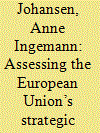

|
|
|
|
|
| Summary/Abstract |
This article argues that the European Union’s capacity to use an operational instrument for the purpose of an articulated objective constitutes an important, but conceptually neglected and empirically underexplored, element of its actorness. In order to fill this gap, the article introduces the concept of strategic capacity and develops an analytical framework for systematic empirical assessments thereof. Drawing on 22 qualitative expert interviews, the framework is applied to the EU’s maritime operation against human smugglers in the Central Mediterranean (EUNAVFOR MED Operation Sophia). The article finds that the EU so far has displayed a fairly low degree of strategic capacity in its fight against human smugglers. The article argues that this fairly low degree of strategic capacity is not to be ascribed to an institutional apparatus that is unfit for strategic action, but a decision on the part of political decision-makers to give weight to symbolic, as opposed to strategic, action. As a result, the operation has contributed little to the formal objective of disrupting and dismantling human smuggling networks in the Central Mediterranean. In some areas, it has even had an adverse effect on this objective.
|
|
|
|
|
|
|
|
|
|
|
|
|
|
|
|
| 2 |
ID:
109845
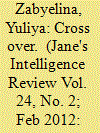

|
|
|
| 3 |
ID:
188015
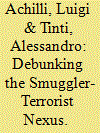

|
|
|
|
|
| Summary/Abstract |
Amid increasing terrorist violence in and beyond European countries, concerns have been raised about connections between illegal migration and terrorism. Regional armed conflicts in the Middle East have led to the massive migration of people in search of safe heavens and better livelihoods, pressing upon frontline countries in the Mediterranean and throughout the EU. Multiple government and intelligence agencies report that human smuggling networks have been identified as providing a readily available conduit through which terrorist groups such as the Islamic State and Al-Qaida can enter Europe and the U.S. These criminal travel networks are said to rely on highly effective transnational alliances involving service providers within source, transit and destination countries. There is also widespread consensus in the intelligence circles that terrorist groups rely on the practice of smuggling for financing of terrorist activity. Nonetheless, despite the region’s geopolitical significance and its demonstrated potential for spillover effects, scant systematic field research has been conducted by independent researchers to understand the purported nexus between terrorism and human smugglers within the Middle East into the Mediterranean. This constitutes a severe gap in knowledge which our study will address. In this paper, we debunk the nexus human smuggling-terrorism by comparing the Islamic State’s logistics with human smuggling networks’ modus operandi and organizational structures. Based on a mixed research approach that combines the analysis of a unique date-set (U.S. Special Forces) and an empirical research carried out among smugglers and migrants in the Middle East and across the Eastern Mediterranean route over the past two years, this paper will tackle the alleged connection between human smuggling and terrorist groups. What will be argued is that smuggling networks and terrorist networks have fundamental operational and structural differences. These operational and structural differences need to be taken into account in order to deconstruct harmful stereotypes on irregular migration and, consequently, develop adequate responses to analytically distinct phenomena.
|
|
|
|
|
|
|
|
|
|
|
|
|
|
|
|
| 4 |
ID:
192997
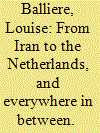

|
|
|
|
|
| Summary/Abstract |
A migrant's journey is no linear trajectory from A to B. It is a fragmented and complex move over different regions with alternating periods of mobility and immobility. This article researches the complex dynamics of irregular migration from Iran to the Netherlands, and everywhere in between. Through a historical comparison of the life stories of Iranian asylum seekers in the Netherlands in two time periods (1988–1989 and 2009–2010), it studies the routes they took, their relations with human smugglers, and their interactions with immigration policies and border managements along the way. It shows migrants' and smugglers’ flexibility and capacity to adapt to ever-changing circumstances. Migration politics and border controls, along with their increasing limitations on legal migration channels, are indeed crucial in the understanding of irregular migration practices and the ever-growing involvement of facilitating services. Through a combination of this migration policy research and the migration trajectory research, the paper explores these dynamics and the interactions between migrants, smugglers, and state policies in every phase of their journey from Iran to the Netherlands, and everywhere in between.
|
|
|
|
|
|
|
|
|
|
|
|
|
|
|
|
| 5 |
ID:
126458
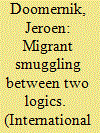

|
|
|
|
|
| Publication |
2013.
|
| Summary/Abstract |
Migration processes are driven by forces that are by their very nature difficult to address with government policies, especially when these are aimed at control and restriction. Yet, in response to domestic and international policies, governments, jointly and individually, seek to intervene forcefully in certain types of migration. Paradoxically, these interventions by and large go against the logic inherent in migration processes and thus have perverse effects: they do little to reduce migration and instead create a market for human smuggling. The thrust of current policy development is in the direction of further criminalisation. It is argued that this is not the most sensible course of action.
|
|
|
|
|
|
|
|
|
|
|
|
|
|
|
|
| 6 |
ID:
128822


|
|
|
| 7 |
ID:
109857
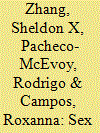

|
|
|
|
|
| Publication |
2012.
|
| Summary/Abstract |
Much has been written in the English-speaking world on the topic of sex trafficking, but little is known about what researchers elsewhere have produced on this topic. An exhaustive literature search was conducted to locate publications on this topic from Latin America. A total of 74 publications were located and put through a systematic content analysis. Four main discernible patterns were noticed: (1) the vast majority of the publications were produced by individuals affiliated with international or non-government organisations; (2) the production of trafficking-related literature sharply declined after 2007; (3) of the small number of studies involving empirical data, most were qualitative in nature; and (4) the literature was primarily focused on the sexual exploitation of children. The discourse on sex trafficking in Latin America appeared to be dominated by advocacy groups. There were few scholarly articles, suggesting limited attention from the academic community. Despite limited empirical data, many Spanish-speaking authors made claims on the nature and extent of sex trafficking, with articles citing one another as source of evidence. This review finds a great need for the involvement of the academic community and for dispassionate and empirically grounded research on sex trafficking.
|
|
|
|
|
|
|
|
|
|
|
|
|
|
|
|
| 8 |
ID:
171824
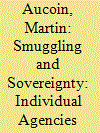

|
|
|
|
|
| Summary/Abstract |
Coverage of ‘Borderland Schengen’ and the European immigration ‘crisis’ continues to produce ‘irregular’ migrants through visual-political processes not only as threats to stability and cohesion in Europe, but as threats to the notion of state sovereignty (Kühnemund 2018). This rhetoric of crisis relies on older models of human smuggling networks in which these networks are characterized as hierarchical ‘businesses’ that threaten to subvert states’ monopolies over human movement through coordinated, organized actions (Baird 2016). Governments and smuggling networks are, however, made up of individuals whose actions constitute the ‘everyday practices’ (Ashutosh and Mountz 2012) and the ‘street level’ policy-making (Lipsky 2010) of the organizations they comprise. The positioning of these individuals within their organizational terrain, or what Pierre Bourdieu defines as the ‘bureaucratic field’ (Bourdieu, Wacquant, and Farage 1994), influences how these everyday practices are carried out. Because of the lack of a homogenous body of practice within these organizations, the ways in which the agents of both networks interact with each other at and across Europe’s borders may differ considerably from their representation in news media and public discourse.
|
|
|
|
|
|
|
|
|
|
|
|
|
|
|
|
|
|
|
|
|